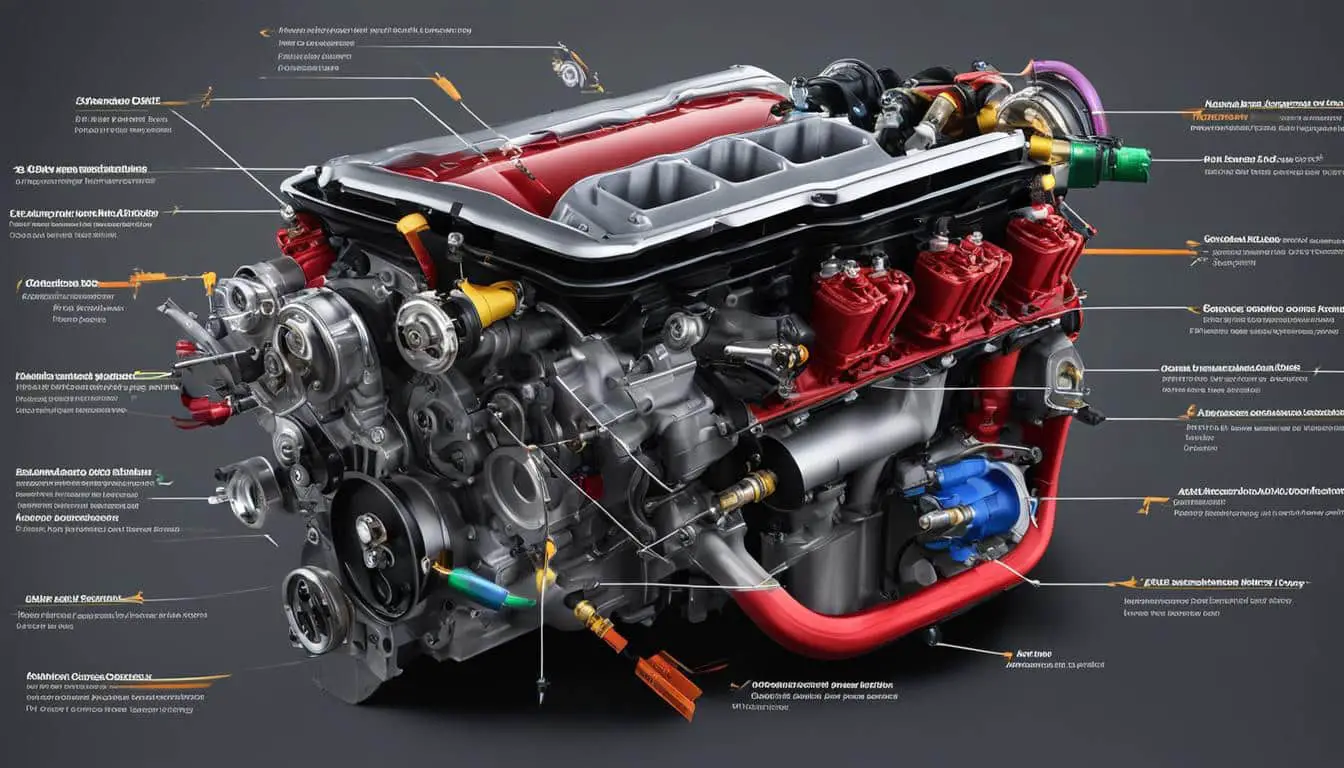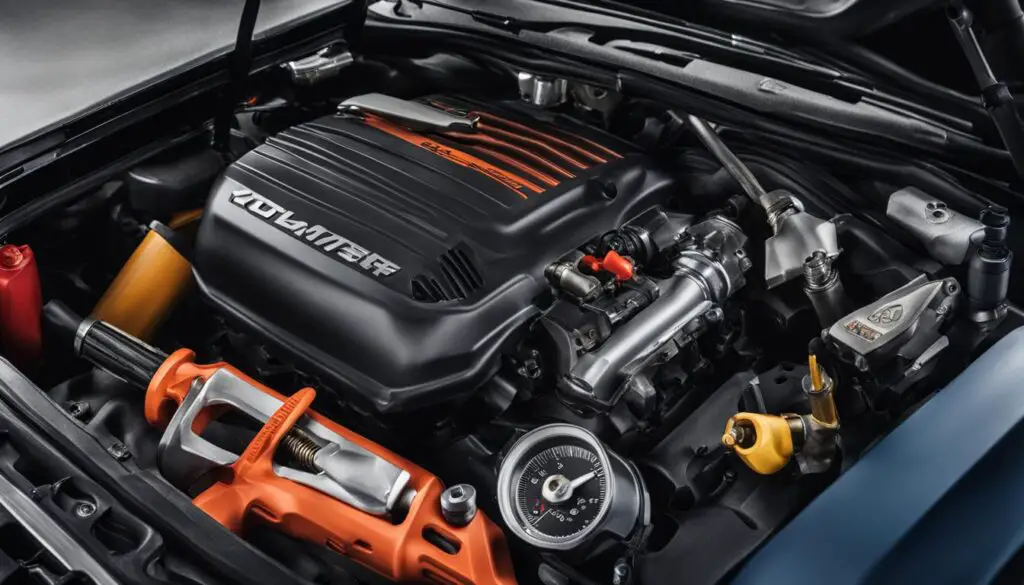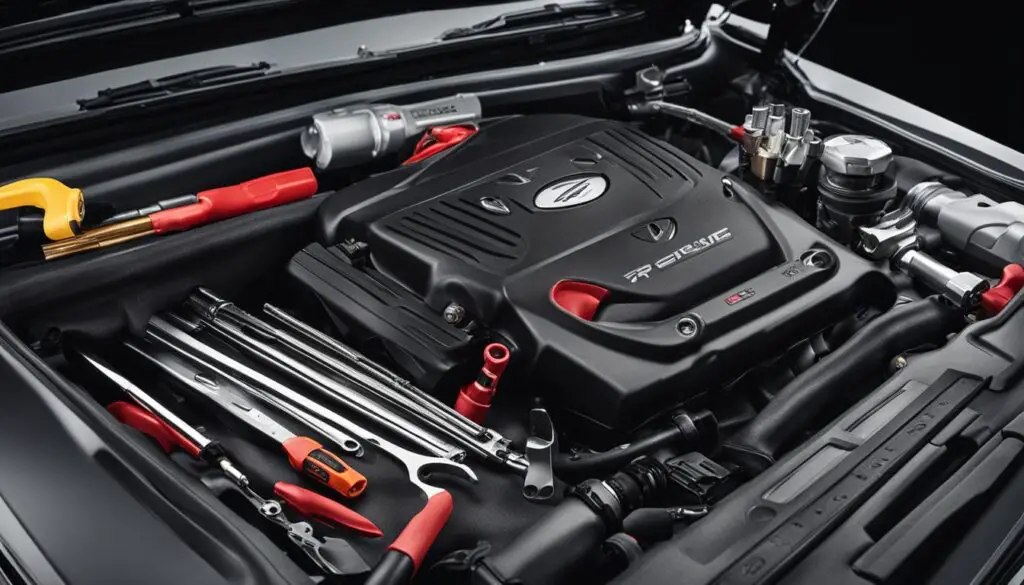
Beginner’s Guide to Car Engine Tuning
Gaining an understanding of engine tuning is essential for any car enthusiast looking to boost their car’s performance and efficiency. However, for beginners, the world of engine tuning may seem overwhelming and confusing. That’s why in this guide, I’ll break down the basics of engine tuning, provide tips for optimizing performance, and teach you how to tune your car engine effectively. By the end of this guide, you’ll have the knowledge to unleash the true power of your car’s engine.
Key Takeaways
- Engine tuning is essential for boosting your car’s performance and efficiency.
- Beginners can feel overwhelmed by the many components of engine tuning, but this guide will break down the basics and provide a clear understanding.
- Optimizing performance can be achieved through adjusting air intake systems, exhaust systems, fuel delivery systems, and engine management systems.
- Effective engine tuning requires setting realistic goals, choosing the right tools and equipment, researching thoroughly, and monitoring and maintaining your modifications.
- Approach engine tuning with caution and prioritize safety at all times.
Engine Tuning Basics
Before diving into the nitty-gritty of engine tuning, it’s important to understand the basics. At its core, engine tuning is the process of making modifications to your car’s engine to optimize its performance. This can be achieved in a variety of ways, such as adjusting the air-fuel ratio, timing the ignition, and improving the engine’s breathing. By fine-tuning these components, you can increase horsepower, improve fuel efficiency, and enhance overall driving performance.
There are several key components involved in engine tuning, including:
| Component | Description |
|---|---|
| Air Intake System | The air intake system is responsible for delivering air to the engine. Upgrading this system can increase airflow and improve horsepower. |
| Exhaust System | The exhaust system is responsible for removing exhaust gases from the engine. Upgrading this system can improve exhaust flow and increase horsepower. |
| Fuel Delivery System | The fuel delivery system is responsible for delivering fuel to the engine. Upgrading this system can improve fuel efficiency and power output. |
| Engine Management System | The engine management system controls the operation of the engine and its various components. Upgrading this system can improve overall engine performance. |
When it comes to engine tuning techniques, there are several methods that can be used to optimize performance, including:
- Adjusting the air-fuel ratio to achieve optimal combustion
- Timing the ignition to improve performance
- Increasing airflow for improved breathing
- Upgrading engine components to enhance overall efficiency and performance
By understanding the basics of engine tuning and the key components involved, you’ll be better equipped to make modifications to your car’s engine and optimize its performance. In the next section, we’ll provide you with tips for effective engine tuning that will help ensure you’re making the most of your modifications.

Tips for Effective Engine Tuning
As a beginner in engine tuning, it’s essential to get things right from the beginning. Here are essential tips that will help you in your engine tuning journey:
1. Set Realistic Goals
Before you start tuning your engine, you need to establish your goals. Do you want to increase horsepower, improve fuel economy, or enhance overall performance? Setting these goals will help you create a clear plan of action and ensure all modifications work towards achieving your objectives. It is essential to set realistic goals that align with your car’s capabilities and your budget.
2. Choose the Right Tools and Equipment
Having the right tools and equipment is crucial for effective tuning. You can’t achieve optimal results with substandard tools, so invest in high-quality tools and equipment. There are toolkits available specifically designed for engine tuning, so make sure you purchase one that best suits your needs. Using the right tools and equipment guarantees that the modifications you make to your engine are accurate and safe.
3. Conduct Thorough Research
Thorough research is critical to effective engine tuning. There are many resources available, such as online forums, car magazines, and tuning guides that can help you learn more about car tuning. Before making any modifications, research the specific components you want to upgrade, their compatibility with your car, and the potential impact on performance. A proper understanding of the modifications you plan to make is essential to ensure optimal results.
4. Monitor and Fine-tune
After making modifications to your car’s engine, you need to monitor its performance closely. This allows you to identify any issues and make the necessary adjustments. Monitoring your engine’s performance allows you to fine-tune and optimize the modifications you’ve made. It’s also essential to conduct regular maintenance to ensure your engine performs optimally.
5. Prioritize Safety
Safety should be a top priority when it comes to engine tuning. Always follow the manufacturer’s guidelines and ensure all modifications comply with local laws and regulations. Make sure all modifications are safe and do not put the driver, passengers, or other road users at risk. Remember, safety should always be the number one concern when tuning your car’s engine.
By following these tips, you can ensure effective engine tuning that results in a smoother ride, increased efficiency, and more power. Remember that engine tuning takes time, patience, and practice, so take your time and enjoy the process.

Conclusion
In conclusion, as I wrap up this beginner’s guide to car engine tuning, it’s essential to understand that engine tuning is a complex process that requires a combination of knowledge, skills, and experience. By following the basics, understanding the components, and implementing effective tuning techniques, you can enhance your car’s performance and unleash its true power.
The importance of safety
However, it’s crucial to prioritize safety above all else when tuning your car’s engine. Always wear appropriate safety gear, work in a well-ventilated area, and take necessary precautions when handling tools and equipment.
Regular maintenance
To ensure that your tuned engine continues to perform optimally, it’s vital to perform regular maintenance. Regularly check your engine’s oil levels, replace filters, and inspect any modifications for wear and tear.
With time, practice, and patience, you’ll become more proficient and confident in engine tuning. Remember, the key to successful engine tuning is to approach it with caution, a willingness to learn, and the right tools and equipment.
FAQ
What is car engine tuning?
Car engine tuning involves making adjustments and modifications to improve the performance and efficiency of your car’s engine. It can include changes to the air intake system, exhaust system, fuel delivery system, and engine management system.
Why should I tune my car’s engine?
Tuning your car’s engine can unlock its true potential by optimizing performance and efficiency. It can enhance acceleration, increase horsepower, improve fuel economy, and provide a smoother driving experience.
Is engine tuning only for professionals?
No, engine tuning can be done by car enthusiasts and beginners as well. However, it is important to have a good understanding of the basics and take necessary precautions to ensure safety.
How do I start with engine tuning?
Starting with engine tuning involves conducting research, setting realistic goals, and understanding the components of your car’s engine. It is recommended to start with basic tuning techniques and gradually progress as you gain experience.
Are there any risks involved in engine tuning?
Yes, there are risks involved in engine tuning, especially if done incorrectly. It can lead to engine damage, decreased reliability, and potential safety hazards. It is important to follow proper guidelines and consult professionals if needed.
What tools do I need for engine tuning?
Some common tools needed for engine tuning include a diagnostic scanner, air-fuel ratio gauge, ignition timing light, and torque wrench. The specific tools required may vary depending on the tuning techniques and modifications you plan to make.
How often should I tune my car’s engine?
The frequency of engine tuning depends on various factors such as the modifications made, driving conditions, and maintenance routine. It is recommended to monitor the performance regularly and conduct tune-ups as needed.
Can engine tuning void my car’s warranty?
Modifying your car’s engine may void its warranty, especially if the modifications are not approved by the manufacturer. It is important to check your warranty terms and consult with the manufacturer or authorized dealers before making any modifications.
